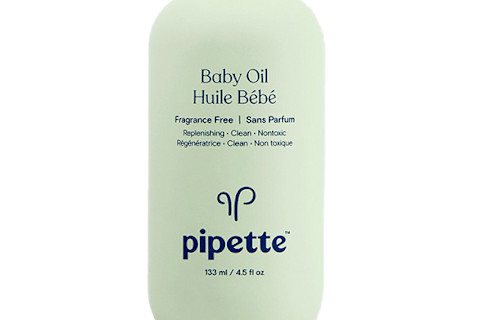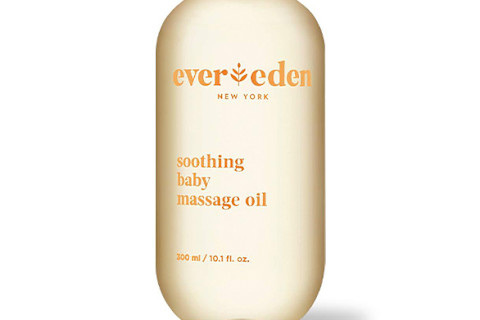What Is Baby Oil & Is It Safe For Skin? Pros, Cons & Best Clean Products
Baby oil is a staple in many households: Not only does it nurture sensitive baby skin, but it also keeps easily irritated adult skin (shall we say?) baby-smooth. And yet—many options contain a highly controversial ingredient that makes many beauty experts raise a brow. But as more and more innovations continue to command the market, you do have baby oil options that are way less cause for concern.
So what makes baby oil so special (and controversial), and what should you look for in a high-quality product? Find our breakdown, below.
What is baby oil?
Baby oil is a clear, moisturizing liquid meant to soothe and smooth delicate baby skin, typically after a bath. Given its ability to lock in water, many adults swear by baby oil to moisturize their own skin as well, especially if they have easily irritated skin. Any product that's fit for a baby's sensitive skin would be top-notch for adults with a compromised skin barrier, no?
But here's the thing about baby oil: Traditional options typically contain mineral oil—a relatively inexpensive, shelf-stable substance compared to other vegetable and fruit oils. The ingredient is highly occlusive, which gives baby oil its moisturizing power—for babies with diaper rash or irritation, the oil can create an occlusive environment so the skin doesn't continue flaking.
"[Mineral oil] is actually very good at maintaining moisture and helping to heal dry, irritated skin, making the skin surface feel and appear soft and supple," says board-certified dermatologist Ava Shamban, M.D., founder of SKINFIVE.
But as we know: Skin care and skin care ingredients are complicated. And just because something can achieve a desired effect doesn't mean it supports skin, body, or environmental health long term. In fact, many experts (Shamban included) still recommend steering clear.
Summary
Pros & cons of mineral oil.
Now, if you type mineral oil into the search bar, you'll likely come across some hot debate. Some deem it unsafe for skin; others say it's totally fine. That's because while mineral oil is petrochemical derived, you can find purified, cosmetic-grade options that are theoretically safe to apply on the skin (as opposed to technical-grade options, which are typically used to lubricate car engines). In fact, products loaded with mineral oil, like petroleum jelly, are commonly used for slugging techniques—the thick, balmy barrier can lock in moisture.
However, even safer, cosmetic-grade mineral oils are not without their issues: First, mineral oil has a very large molecular size, so while it's highly occlusive, it's unable to actually penetrate the skin. This can create a host of problems in the long run—and is why many experts have started to criticize its use.
"It more suffocates the skin than anything else," says Shamban. "The molecular structure is simply too large so it can both clog pores, cause a disruption or even damage to the skin barrier, and ultimately increase transepidermal water loss." (Remember: You still need some degree of transepidermal water loss1 for proper skin barrier function, as it signals to your skin cells that it's time to jump-start repair; if there's no signaling, your skin cells may think everything is A-OK and won't repair.) And while the actual oil might not clog your pores, such an occlusive environment can trap dead skin and oil, causing acne to thrive.
Then there's the environmental component, which is enough of a reason to avoid its use: "Mineral oil is petrochemical derived, meaning it's environmentally irresponsible to use mineral oil when there are vegetable and fruit oils, like coconut oil, that are more sustainable," says clean cosmetic chemist Krupa Koestline. It also does not biodegrade well2, and it can accumulate in waterways. Remember: To us, clean beauty means it's safe for both you and the world around you.
Summary
How to choose the right baby oil.
Our take? We tend to avoid mineral oil altogether, given its environmental concerns and the mere fact that you can find better oils to replenish the skin barrier with healthy lipids and antioxidants, as opposed to one that just sits atop it to keep water locked in.
While traditional baby oils do tend to include mineral oil, you can find plenty of options on the market without the controversial ingredient. If you are looking for a cleaner alternative, Koestline suggests selecting a baby oil with coconut or jojoba oil in the formula: "Several studies have shown that vegetable and fruit oils like coconut oil and jojoba oil have just as much moisturization potential as mineral oil3," she notes.
Shamban seconds the notion—she also mentions argan, rosehip, marula, sunflower seed, neem, hemp, and grapeseed oil will get the job done. If you're looking for baby oil fit for hypersensitive skin, just make sure you find one without fragrance, as any scent can aggravate easily irritated complexions.
Peek our favorite options below, and slather on.
Our recommendations.
How to use it.
As Shamban reminds us: "[Oils are] the gatekeepers, acting as occlusive agents [to] keep present moisture in, but they do not actually produce moisture for dehydrated skin." In other words: Oils cannot trap in water if there's no water present for them to trap.
That said, apply your baby oil to damp skin—ideally after a bath or shower. It should be the last step of your routine (nothing can get past an occlusive, remember?), so if you do use some sort of body serum, you'll want to apply that product beforehand.
The takeaway.
Traditional baby oils are typically loaded with mineral oil—an ingredient that, yes, is generally safe when it's cosmetic-grade but still comes with a host of environmental and skin concerns. We recommend you find a product without the petroleum-derived substance if you can, like the high-quality options above—they're fit for even the most sensitive of skin.



